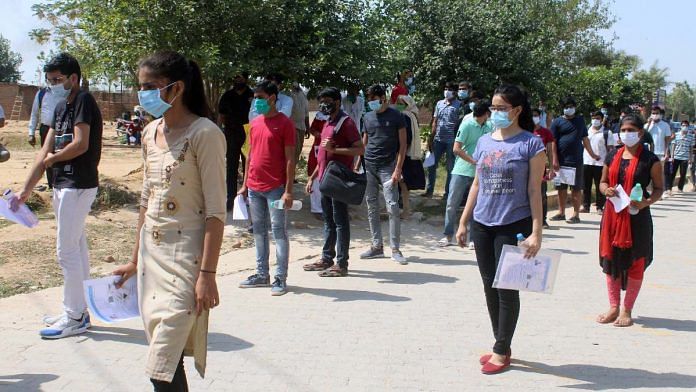New Delhi: Everyone knows it’s tough to crack the qualifying tests for the prestigious Indian Institutes of Technology (IITs), but data released by the body overseeing the entrance examination puts some numbers on how much.
Fifty-seven of the 114 questions in the Joint Entrance Examination (JEE) Advanced 2021 were wrongly answered by more than 90 per cent of the candidates. Six questions were such that less than 2 per cent of students were able to answer correctly.
These numbers come from data released by the Joint Implementation Committee of JEE Advanced 2021, based on an analysis of last year’s maths, chemistry, and physics papers. The analysis included both Paper 1 and Paper 2, each of which tests aptitude in mathematics, physics, and chemistry.
The JEE Advanced is touted to be one of the most difficult undergraduate entrance exams in the world. To be eligible to sit for it, students first have to first get top scores in the JEE Mains, which is an entrance test for admission to various undergraduate programmes in engineering and architecture.
Last year, of the nearly 9 lakh students who appeared for the JEE Mains, 1,41,699 were finally able to sit the JEE Advanced, according to data shared by the committee. Out of these, 41,862 students, or about 29 per cent, eventually qualified for a seat at an IIT. But only 16,296, or about 12 per cent, were finally offered seats.
According to some IIT professors whom ThePrint spoke to, the data points towards the difficulty level of the papers more than candidates’ aptitude in these subjects. They also emphasised that the competitive exam is predicated on a process of elimination rather than selection.
“The level of competition is so high that we cannot keep simple questions. We have to have such a pattern that only the best of the best students can solve them. There is a limited number of students that we can select, so the questions have to be according to that,” said Shalabh (he does not use a last name), an IIT Kanpur professor who was involved in setting question papers for the JEE Advanced in the past.
Shalabh, however, said that despite their toughness, all the questions pertained to concepts taught in “basic” school syllabi prescribed by the Central Board of Secondary Education (CBSE) and other boards. “Students who have their basics clear should be able to answer the questions,” he said.
Also read: No life, no hobbies, burnout, lost childhood — the price students pay for a prized IIT seat
‘Question papers need to be tough’
In all, the data shows that 15 questions were left unattempted by more than 60 per cent of candidates.
Of these 15 questions, 10 were from mathematics. One multiple choice question (MCQ) in maths was unattempted by 72.72 per cent of students, which translates to 1,03,049 students. Out of those who did attempt this question, only 6.72 per cent of students were able to provide the right answer.
Twenty-two questions in maths were answered correctly by less than 10 per cent of candidates. The same went for 20 questions in chemistry and 12 in physics. For two questions in chemistry, less than 1 per cent of candidates were able to write the right answers.
Another question from chemistry also seemed to stump students. In all, 1,04307 students (73.61 per cent) didn’t attempt to answer it. Out of those who did attempt it, only 2.16 per cent were able to give the correct response.
“For the number of students we have to select from the given lot, the question papers need to be tough,” said Manindra Agrawal, another IIT-Kanpur professor.
Amid criticism around the pressures of these exams, IIT representatives have maintained a similar line. For instance, in a 2018 interview, former IIT Delhi director V. Ramgopal Rao had asserted that the exam was “tricky and complicated” because it was designed to “reject candidates, not to select them”.
(Edited by Asavari Singh)
Also read: IISc, India’s lone science gem that keeps topping global rankings, leaving IITs, IIMs behind



